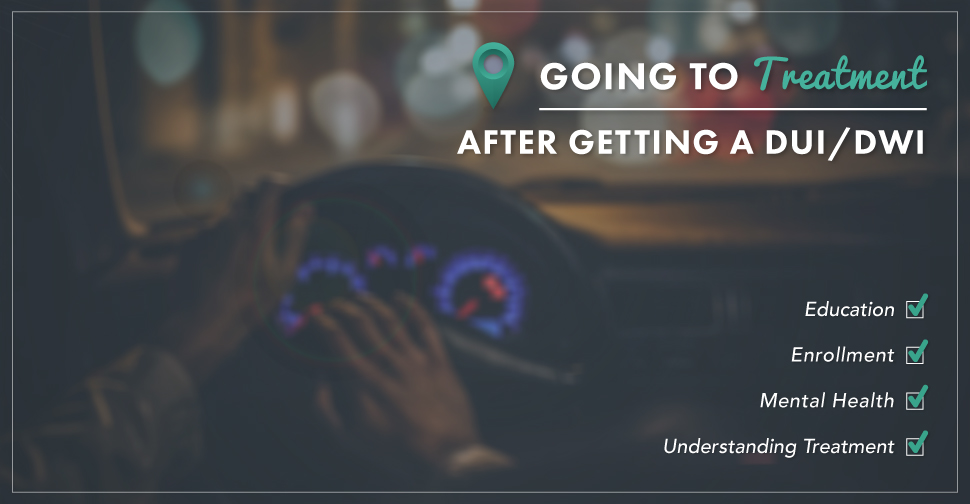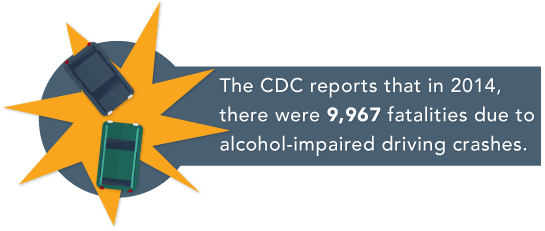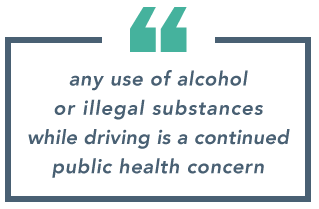
In today’s society drinking is a commonplace practice among certain social sectors. While joining in these social environments, not all individuals are responsible with their drinking habits. For some, this may lead them down a dangerous path they didn’t foresee. After a night of drinking, an unfortunate number of people get behind the wheel of a car while either completely intoxicated or significantly influenced by the effects of alcohol.
Sometimes, unbeknownst to friends and family, this behavior may be indicative of underlying alcohol abuse or addiction. Within this situation, a person may not understand the tragedy these issues can cause themselves and others if left unchecked. The CDC reports that in 2014, there were 9,967 fatalities due to alcohol-impaired driving crashes, equating to nearly a third of all traffic-related fatalities that year.
The inner struggle for some of these individuals is knowing when enough is enough, and how to keep themselves and others safe. A staggering 1.3 million people are arrested every single year for driving under the influence (DUI) or driving while intoxicated (DWI). A DUI/DWI offender may be directed to a treatment facility prior to the official judgement or as included within their sentencing.
Enrolling In A Treatment Program Can Help In Many Ways
If you or a loved one is facing a DUI or DWI, it may be helpful to enroll in an alcohol or drug rehabilitation program. By doing so, it shows that you realize and accept that you have a problem, and that you are willing to be proactive about addressing it. If the DUI/DWI is a first offense, these actions may help prevent jail time, beyond what you experienced the night of the arrest.

If you have multiple offenses, seeking treatment may help to reduce the legal repercussions of your offense. In some circumstances, enrolling in a program may also help save your driver’s licence. There are many benefits to proceeding in this manner, including giving your lawyer a better argument. They can maintain that you are getting the help you need, in the capacity that your punishment should be reduced or dropped altogether. Consider every option when going through these circumstances.
Beyond the ways treatment may help address your legal concerns, it also has the capacity to bring better balance and wellness to your life. Alcohol abuse is a very serious concern, oftentimes one that is precipitated by other concerns, including mental illness. A good treatment program can address these needs, while helping you to obtain sobriety and better health.
Mental Health And Alcohol Use
The Substance Abuse and Mental Health Services Administration’s (SAMHSA) publication, “The N-SSATS Report: Types of Services Provided by Programs for Driving Under the Influence or Driving While Impaired Clients” cites that studies of DUI/DWI offenders have shown that these individuals have much higher risks of multiple substance abuse issues and comorbid psychiatric disorders. Those individuals with numerous offenses have also been shown to struggle with neurocognitive impairments. Because of this, it is important to understand the role that mental health has in alcohol abuse.
As of 2014, within the United States, an estimated 43.6 million adults aged 18 years and older, had a mental illness. 9.8 million of these individuals experienced one that was considered serious, with one of the highest percentages occurring in individuals ages 18-25, equating to 1.7 million Americans. An overwhelming 15.7 million adults and 2.8 million youth (ages 12-17) experienced at least one major depressive episode within this year.
Within this same year, an estimated 22.5 million Americans aged 12 and older experienced the need for alcohol or drug treatment, as found by self-reported statistics, and an additional 11.8 million adults desired counseling or mental health treatment. According to SAMHSA, by 2020, mental and substance use disorders will be greater than physical diseases worldwide, in terms of cause for disability.
Helping to prevent these mental and substance use disorders and other related problems in youth, young adults, and adults is highly needed to change Americans’ behavior and overall physical and mental health. People who have mental illnesses are more likely to use alcohol or drugs than those who do not have these disorders. If individuals, families, and communities can address these issues early on, behavioral health and substance use disorders may be prevented. This may then lessen the impact that these concerns have on individuals and communities both, including possibly, the risky behaviors that may lead to a DUI or DWI.
These Patterns May Be Changing
A 2015 SAMHSA press announcement offered some encouraging statistics. They reported that the percentage of individuals aged 16-20 who engaged in drinking and driving dipped down 59% from the years 2002-2014. During this time, the 21-25 age group witnessed a 38% decline in drinking and driving as well. Further, amongst youth and young adults ages 16-25, the combination of driving under the influence of both alcohol and marijuana decreased by 39%.
Acting SAMHSA Administrator Kana Enomoto commented on this, stating that “The decline in driving under the influence of alcohol, and alcohol and marijuana combined, among youth and young adults is encouraging, and may in part be due to greater outreach and law enforcement efforts.”
 Despite these promising statistics, we must still remain mindful of the detriment and reality of drinking and driving. Ms. Enomoto continued, saying, “However, any use of alcohol or illegal substances while driving is a continued public health concern, particularly during this holiday season when many families and friends are traveling to social gatherings that often include alcohol as part of the festivities.”
Despite these promising statistics, we must still remain mindful of the detriment and reality of drinking and driving. Ms. Enomoto continued, saying, “However, any use of alcohol or illegal substances while driving is a continued public health concern, particularly during this holiday season when many families and friends are traveling to social gatherings that often include alcohol as part of the festivities.”
Understanding DUI/DWI Treatment Facilities
While these statistics give us hope, there are still many individuals across the country who need help with drinking and driving behaviors. Most DUI/DWI treatment programs use an outpatient setting, and may be a shorter length than other outpatient programs. DUI/DWI programs that integrate educational programs, as well as restorative aspects—such as cognitive-behavioral therapy, relapse prevention, and motivational interviewing, are much more efficient in bringing about the needed behavioral changes each individual requires.
Gaining an understanding of the different characteristics of a DUI/DWI program and the variety of services they offer can help to assist those -who are assessing the different needs brought about by this serious concern. Some facilities cater only to DUI/DWI clients, others may offer general treatment that includes a program implemented for these individuals, while some programs do not offer specific programs of this nature.
Within these treatment options, reports indicate that facilities who helped DUI/DWI clients quite commonly, if not always, used the following evidence-based or therapeutic approaches: substance abuse counseling (91-96%), relapse prevention (66-84%), and cognitive-behavioral therapy (54-74%). Thirty percent of facilities geared directly toward DUI/DWI clients provided screening for mental disorders, while 71% of both facilities that served DUI/DWI and other types of clients, and those without a designed DUI/DWI program, provided these screenings.
Greater than half of all outpatient-only facilities gave drug or alcohol urine screens (60-79%) and half to two thirds of them gave breathalyzer or different blood alcohol tests (50-68%). Beyond this, certain medications may be used to address an individual’s unique needs, including medications for mental health disorders and substance abuse concerns. SAMHSA reports that in 37% of all outpatient-only facilities, Campral, Vivitrol, and Antabuse were given for treatment of alcohol addiction. Only nine percent of facilities that served DUI/DWI patients only, provided these three medications.
In certain instances, such as a very severe alcohol addiction, a medical detox or an inpatient rehab program may be necessary. During these residential stays, a person will have greater access to the various treatment modalities and support that are needed during this time.
Greater Education Is Needed
Providing greater access to preventative education and therapeutic practices is greatly needed for this public health hazard. Giving treatment services to DUI/DWI offenders to help restore behavioral balance is highly necessary. These services can help save lives—not only those of the offenders, but of the victims they may cause damage or even death to. One third of DUI/DWI offenders relapse, so it is crucial that facilities provide aftercare services, including relapse prevention, and also discharge plans, to help with stability and recovery post treatment.

Because DUI/DWI clients have high rates of un-diagnosed mental problems, and only 30% of facilities serving DUI/DWI patients only provide mental disorder screens against the 71% of the other types of facilities, it is important to consider both options. In the future, programs who serve DUI/DWI clients alone may consider adding more services to address and identify these mental health problems, in order to better serve their clients.
Let Us Help You Get In Better Control Of Your Life
If you or a loved one is facing a DUI/DWI charge, or if you’re concerned that your drinking behaviors may lead you to risky behaviors like operating a vehicle after you’ve consumed alcohol, reach out for help today. An undercurrent of mental and emotional problems, left un-diagnosed, can lead to greater harm to not only yourself, but to others around you. Contact us today at DrugRehab.org for more information on recovery treatment from a DUI/DWI charge, and we will gladly help you.
For More Information, Be Sure To Check Out These Additional Resources From DrugRehab.org:
- How Long Does Alcohol Stay in Your System?
- What Is A Brompton Cocktail Addiction?
- What Does Alcohol Do to Your Liver?
- What Helps With Alcohol Withdrawal?
- Cocaine And Alcohol: A Deadly Combination
- Alcohol Effects – What Happens To Your Body
Sources
Driving Laws — After a DUI or OWI Arrest: Consider Enrollment in a Rehabilitation Program
Substance Abuse and Mental Health Services Administration — Behavioral Health Trends in the United States: Results from the 2014 National Survey on Drug Use and Health
Substance Abuse and Mental Health Services Administration — Prevention of Substance Abuse and Mental Illness

